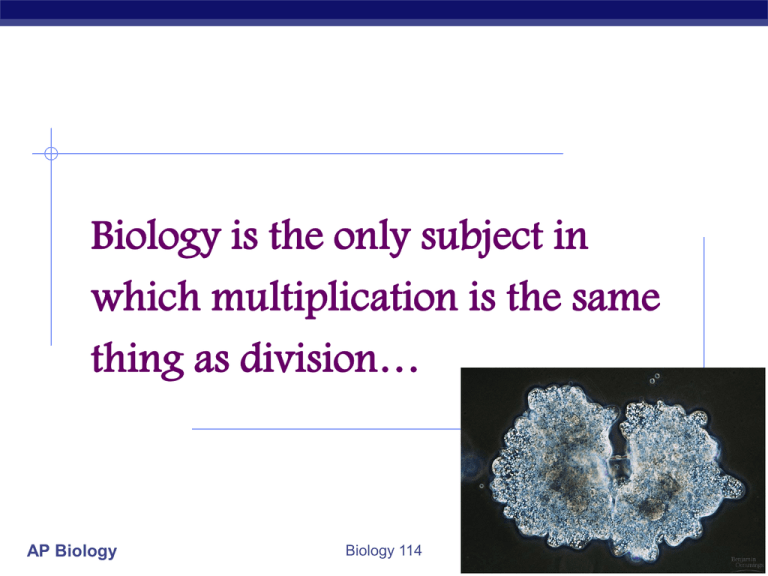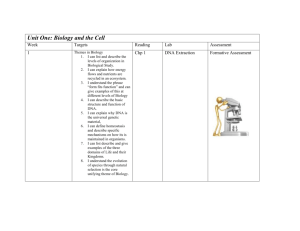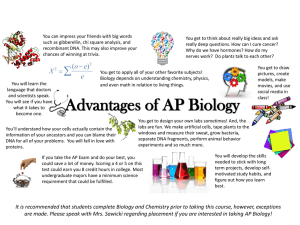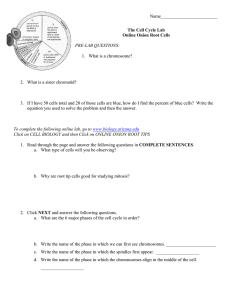Ch9+mitosis+(+Week+5)
advertisement

Biology is the only subject in which multiplication is the same thing as division… AP Biology Biology 114 Chapter 12. The Cell Cycle: Cell Growth, Cell Division AP Biology Biology 114 Where it all began… You started as a cell smaller than a period at the end of a sentence… . AP Biology Getting from there to here… Cell division continuity of life = reproduction of cells reproduction unicellular organisms growth repair & renew Cell cycle AP Biology life of a cell from origin to division into 2 new daughter cells Getting the right stuff What is passed to daughter cells? exact copy of genetic material = DNA this division step = mitosis assortment of organelles & cytoplasm this division step = cytokinesis chromosomes (stained orange) in kangaroo rat epithelial cell AP Biology Copying DNA Dividing cell duplicates DNA separates each copy to opposite ends of cell splits into 2 daughter cells human cell duplicates ~3 meters DNA separates 2 copies so each daughter cell has complete identical copy error rate = ~1 per 100 million bases 3 billion base pairs mammalian genome ~30 errors per cell cycle mutations AP Biology A bit about DNA DNA is organized in chromosomes double helix DNA molecule associated proteins = histone proteins DNA-protein complex = chromatin organized into long thin fiber AP Biology Copying DNA with care… After DNA duplication chromatin condenses AP Biology coiling & folding to make a smaller package from DNA to chromatin to highly condensed mitotic chromosome Chromosome Duplicated chromosome consists of 2 sister chromatids narrow at their centromeres contain identical copies of the chromosome’s DNA AP Biology M Mitosis Cell cycle Cell has a “life cycle” cell is formed from a mitotic division cell grows & matures to divide again G1, S, G2, M epithelial cells, blood cells, stem cells AP Biology G2 Gap 2 G1 Gap 1 S Synthesis cell grows & matures to never divide again liver cells G0 brain nerve cells G0 Resting M Mitosis Cell Division cycle Phases of a dividing G2 Gap 2 G1 Gap 1 cell’s life interphase S Synthesis cell grows replicates chromosomes produces new organelles & biomolecules mitotic phase cell separates & divides chromosomes mitosis cell divides cytoplasm & organelles cytokinesis AP Biology G0 Resting Control of Cell Cycle AP Biology Interphase 90% of cell life cycle cell doing its “everyday job” produce RNA, synthesize proteins prepares for duplication if triggered Characteristics AP Biology nucleus well-defined DNA loosely packed in long chromatin fibers Interphase Divided into 3 phases: G1 = 1st Gap cell doing its “everyday job” cell grows S = DNA Synthesis copies chromosomes G2 = 2nd Gap prepares for division cell grows produces organelles, proteins, membranes AP Biology Interphase G2 Nucleus well-defined chromosome duplication complete DNA loosely packed in long chromatin fibers Prepares for mitosis AP Biology produces proteins & organelles Mitosis copying cell’s DNA & dividing it between 2 daughter nuclei Mitosis is divided into 4 phases prophase metaphase anaphase telophase AP Biology Overview AP Biology Prophase Chromatin (DNA) condenses visible as chromosomes chromatids fibers extend from the centromeres Centrioles move to opposite poles of cell Fibers (microtubules) cross cell to form mitotic spindle actin, myosin Nucleolus disappears Nuclear membrane breaks down AP Biology Prometaphase Proteins attach to centromeres creating kinetochores Microtubules attach at kinetochores connect centromeres to centrioles Chromosomes begin moving AP Biology Kinetochore Each chromatid has own kinetochore proteins AP Biology microtubules attach to kinetochore proteins Metaphase Spindle fibers align chromosomes along the middle of cell meta = middle metaphase plate helps to ensure chromosomes separate properly so each new nucleus receives only 1 copy of each chromosome AP Biology AP Biology Anaphase Sister chromatids separate at kinetochores move to opposite poles pulled at centromeres pulled by motor proteins “walking”along microtubules increased production of ATP by mitochondria Poles move farther apart AP Biology polar microtubules lengthen Separation of chromatids In anaphase, proteins holding together sister chromatids are inactivated separate to become individual chromosomes 1 chromosome AP Biology 2 chromatids 2 chromosomes Chromosome movement Kinetochores use motor proteins that “walk” chromosome along attached microtubule AP Biology microtubule shortens by dismantling at kinetochore (chromosome) end Telophase Chromosomes arrive at opposite poles daughter nuclei form nucleoli from chromosomes disperse no longer visible under light microscope Spindle fibers disperse Cytokinesis begins AP Biology cell division Cytokinesis Animals cleavage furrow forms ring of actin microfilaments forms around equator of cell myosin proteins tightens to form a cleavage furrow, which splits the cell in two like tightening a draw string AP Biology Cytokinesis in Animals QuickTime™ and a Animation decompressor are needed to see this picture. AP Biology (play Cells Alive movie here) Mitosis in whitefish blastula AP Biology Mitosis in animal cells AP Biology Cytokinesis in Plants Plants vesicles move to equator line up & fuse to form 2 membranes = cell plate derived from Golgi new cell wall is laid down between membranes new cell wall fuses AP Biology with existing cell wall Cytokinesis in plant cell AP Biology Mitosis in plant cell AP Biology onion root tip AP Biology Evolution of mitosis Mitosis in eukaryotes likely evolved from binary fission in bacteria single circular chromosome no membranebound organelles AP Biology Evolution of mitosis Mechanisms intermediate between binary fission & mitosis seen in modern organisms AP Biology protists Dinoflagellates algae “red tide” bioluminescence AP Biology Diatoms microscopic algae marine freshwater AP Biology Any Questions?? AP Biology Biology 114 Any Questions?? AP Biology Biology 114 Aaaaah… Structure-Function yet again! AP Biology




